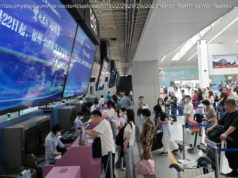Only 36 per cent of executives surveyed chose China as their top prospective destination for 2017-2019, lower than the 40 per cent who favoured the US
For the second straight year, China has been outpaced by the US in attracting potential investment by multinational companies. That’s according to a business survey released on Thursday by the United Nations Conference for Trade and Investment (UNCTAD) . Only 36 per cent of executives surveyed chose China as their top prospective destination for 2017-2019, lower than the 40 per cent who favoured the US. That showing, however, marked an improvement for China compared with the survey results a year earlier when just 21 per cent of participating executives viewed China as their top destination. In decades past, China drew investment from the vast majority of Fortune 500 companies, with its relatively low costs, sound infrastructure and promising market. But the nation is quickly losing its allure amid rising labour and land costs, intrusive state regulatory policies and fierce competition from local players. Numerous foreign companies have scaled back operations or even withdrawn from the Chinese market; the US hard-drive giant, Seagate, for instance, closed a Suzhou factory at the end of last year. China’s received foreign investment dropped about 1 per cent to US$13.4 billion last year, ranking third-largest after the US$39.1 billion of the United States and the US$25.4 billion of the United Kingdom. Foreign businesspeople in China have long complained about unfair regulations, slow progress in launching the business and a deteriorating investment environment. The strict capital controls China imposed at the end of last year to offset outflows also worried investors who felt it would now be more difficult to remit profits back to home countries. In a white paper released in April, the American chamber of commerce called 2017 “one of the most challenging years in decades for US companies in China”, citing uncertainty stemming from political and economic transitions in both the US and China, perceptions of a deteriorating investment environment for foreign companies in China and a slowing economy. US President Donald Trump is trying to encourage US businesses to return home. His administration has proposed a substantial corporate income tax cut and a one-off levy on multinational companies’ overseas profits; at the same the Trump administration also has threatened to impose tariffs on inbound goods to court the return of capital. Meanwhile, the new president’s administration is enjoying the benefits of a recovering economy at a time of limited hikes in interest rate. Beijing still relies on foreign technology and expertise to help upgrade its economy, with the focus shifting to high-end manufacturing, technology and the service sectors. To attract more foreign investment, Beiing’s pilot-project free trade zone was expanded in April to include 10 more provinces. Generally, the business community has shown renewed optimism, despite elevated geopolitical risks and policy uncertainty. “Unlike in 2016, a majority of executives polled, particularly in developed economies, are confident that the economic upturn will strengthen, bolstering investment in the coming years, ” the UNCTAD said. It said it expects FDI inflows to developing Asia to rise by 15 per cent in 2017 to US$515 billion, with China a major destination. Meanwhile, the United Nations agency said it anticipates China’s outbound investment activity undergoing a significant structural change. “More investment through greenfield projects in developing economies is expected, propelled by the accelerated implementation of the Belt and Road Initiative, whereas cross-border M&As in developed countries are likely to decline, ” it said.






